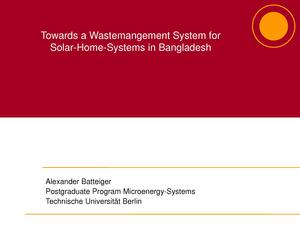Click here to register!
Towards a Waste Management System for Solar Home Systems in Bangladesh
Towards a Waste Management System for Solar Home Systems in Bangladesh
Presenters: Alexander Batteiger (Technische Universität Berlin, Germany)
Rapporteur: Max Morrison
Overview
| One of the most recognized rural electrification programs in the world is the SHS-Program in Bangladesh. Based on the steadily growing high installation rates of SHS future waste generation was estimated on a country level. In 2012 at least 200.000 lead-acid batteries (LABs) from SHS-Program were disposed. Lifespan of LABS is the crucial factor for the estimation of future waste generation. Depending on the average lifespan, between 800.000 and 1.2 Million LABS equaling an amount of 6.000 to almost 10.000 metric tons of Lead per year is estimated to enter the waste management system of Bangladesh in 2016. Further research on regional levels and mass flows should be conducted to prepare the waste management system of Bangladesh for the estimated waste.[1]. |
Issues Presented
► Please see the presentation.
- Data scarcity was a challenge in attempts at multivariate analysis. Assumptions were made based on average of batteries sold/manufactured.
- Lead waste is set to dramatically increase from batteries ending their useful lifespan. The waste management system is as of yet unprepared for this influx.
- Collection and waste treatment is set to expand dramatically.
- 70% of lead is just environmental release at this point.
- Acid is poured “here and there” and lead is taken to local recycling centers.
Q & A
1. Is there an incentive system to recycle the batteries?
- A: Guarantee of 5 years for the battery. Not a huge incentive for implementing organization to recycle the batteries properly. Recycling of lead is worth less than the end product.
2. If battery needs to be replaced after 5 years, do users go back to provider to get a new battery?
- A: People who have systems longer than 5 years tend to go to the informal sector.
3. Talk about the panels themselves please.
- A: Little research is being done in Bangladesh about this. My research focused on batteries because of their shorter lifespan.
4. Is there more problem in collecting battery from household level or from the institutional recycling level?
- A: Policy has a possibility to influence the institutions to recycle them. But collecting the battery is hard to incentivize on a large scale. The ability to influence collection of batteries is limited. Second hand market is primary sink for batteries nearing the end of their life.
5. Are you planning to analyze the institutional setting Re: collection programs/informal sector? An interesting question would be how the informal systems work and interact with the battery providers. My research focuses on the technical aspect of the distribution. I want to gather more knowledge about the society and institution over there and how they work together.
References
- ↑ Towards a Waste Management System for Solar Home Systems in Bangladesh. Alexander Batteiger





















